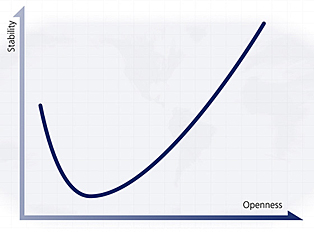Ian Bremmer
[8][9][6] Bremmer founded the political risk research and consulting firm Eurasia Group in 1998 in the offices of the World Policy Institute in New York City.
The J is steeper on the left-hand side, as it is easier for a leader in a failed state to create stability by closing the country than to build a civil society and establish accountable institutions; the curve is higher on the far right because states that prevail in opening their societies (Eastern Europe, for example) ultimately become more stable than authoritarian regimes.
Bremmer said the 2007–2008 financial crisis had made it "harder for westerners to champion a free-market system and easier for China and Russia to argue that only governments can save economies on the brink".
[19] The term G-Zero world refers to a breakdown in global leadership brought about by a decline of Western influence and the inability of other nations to fill the void.
[20][21] It is a reference to a perceived shift away from the pre-eminence of the G7 industrialized countries and the expanded G20 major economies, which includes emerging powers like China, India, Brazil, Turkey, and others.
[22][23] The term weaponization of finance refers to the foreign policy strategy of using incentives (access to capital markets) and penalties (varied types of sanctions) as tools of coercive diplomacy.
[24][25][26][27] Bremmer coins the term weaponization of finance to describe the ways in which the United States is using its influence to affect global outcomes.
Rather than rely on traditional elements of America's security advantage – including US-led alliances such as NATO and multilateral institutions such as the World Bank and the International Monetary Fund – Bremmer argues that the US is now "weaponizing finance" by limiting access to the American marketplace and to US banks as an instrument of its foreign and security policy.
[25][27] Bremmer uses pivot state to describe a nation that is able to build profitable relationships with multiple other major powers without becoming overly reliant on any one of them.
[32] He sees the present geopolitical recession as defined by deteriorating relations between the US and its traditional allies—particularly the Europeans—as China is rising and creating an alternative international political and economic architecture.
Bremmer argues that the overall result is a more fragmented approach to global governance, an increase in geopolitical tail risks, and a reduced ability to respond effectively to major international crises.
[33][34] Bremmer proposed creating a “World Data Organization” to forestall a division in technology ecosystems due to conflict between the United States and China.
He described it as a digital version of the World Trade Organization, arguing that the United States, Europe, Japan, and other “governments that believe in online openness and transparency” should collaborate to set standards for artificial intelligence, data, privacy, citizens’ rights, and intellectual property.
He wrote these non state actors are now shaping geopolitics and exercise a form of sovereignty over a rapidly expanding digital space that is out of reach of national governments.
In July 2017, Bremmer broke news of a second, previously undisclosed meeting between Presidents Trump and Putin during the G20 heads of state dinner in Hamburg.
